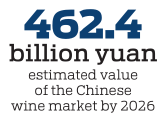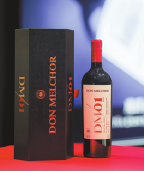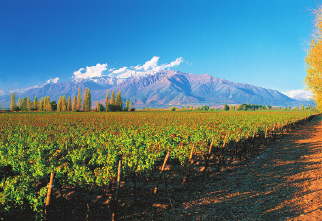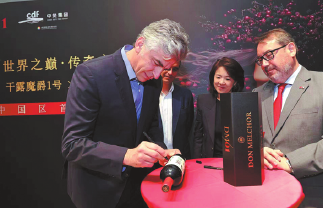

DM/01 2022, a limited-edition vintage released by Don Melchor winery.

Don Melchor winery in Chile's Maipo Valley.

The Beijing launch of DM/01 2022 marks another step forward for Chilean premium wine in one of its most dynamic markets.
In 1883, pre-phylloxera Bordeaux grapevines were first planted in Chile's Maipo Valley. More than a century later, Don Melchor winery has become one of the country's most celebrated names, with a reputation as one of the world's leading wine producers and over 16 vintages rated above 95 points by the International Wine Press.
This month, the winery unveiled its latest creation in China — DM/01 2022, a limited-edition vintage sourced from the historic Parcel No 1 in Puente Alto. The launch event, nearly 20,000 kilometers from its origin, marks another step forward for Chilean premium wine in one of its most dynamic markets.
China has emerged as a key destination for bottled Chilean wine, with the South American country now ranking 5th in the world by export value and fourth by volume. In recent years, Chilean wine has accounted for 15 to 20 percent of China's imports, placing it firmly among the top suppliers, according to Pablo Arriaran Ahumada, Chile's ambassador to China.
At the same time, China's wine market is expanding rapidly. The value of the Chinese wine market is projected to grow from 268.6 billion yuan ($37.7 billion) in 2021 to 462.4 billion yuan by 2026 — an impressive compound annual growth rate of 11.5 percent, according to GlobalData, an analytics company.
These shifts reflect a broader consumer transition toward quality and authenticity, especially among millennials and Generation Z (those born from the mid-1990s to the early 2010s), who are driving demand toward niche, premium labels beyond the traditional staples, creating new opportunities for producers like Don Melchor.
Enrique Tirado, Don Melchor's exclusive winemaker since 1997, describes the wine as a break from the estate's traditional blends. "This vintage expresses the pure essence of our most treasured plot, offering a unique reflection of our terroir and craftsmanship," he says.
The wine will be distributed through China Duty Free Group's retail channels. Sun Fang, CDFG's vice-president, says the collaboration reflects the evolving tastes of Chinese consumers: "Demand is becoming more diverse, especially among younger generations. Whiskey is growing quickly, and premium wine is also seeing strong, more rational growth."
Sun notes that travel retail serves a focused audience of both local consumers and international visitors, and this wine is not only for China's domestic market, but also for travelers seeking unique experiences.
Ahumada calls the launch "a celebration of history, culture and friendship" between the two nations. "Chile is recognized worldwide for its natural diversity and the quality of its products. Among them, wine holds a very special place. It is not only one of our main exports, but also a symbol of our national identity," he says.
He emphasizes that the growing presence of Chilean wine in China reflects more than trade ties: "Thanks to our Free Trade Agreement and deepening cooperation, Chile has become one of China's leading wine suppliers. But what we value most is seeing how Chinese consumers have developed a genuine appreciation for Chilean wine, recognizing its authenticity and strong connection with nature."
He adds that wine plays a cultural role that transcends commerce: "Wine is more than a product; it is a story told through the land, the climate, and the people who cultivate it. Each glass carries with it a piece of Chilean heritage and a message of friendship."
Looking ahead, the ambassador hopes events like this will encourage greater cultural exchange.
"We see wine as a cultural ambassador of Chile," he says. "It is meant to be shared, to inspire conversation, and to serve as a universal language that brings people closer. In each toast, there is an opportunity to build a bridge between our nations."
liyingxue@chinadaily.com.cn

